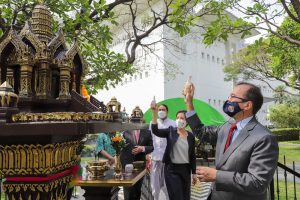Contractors have broken ground on a large annex to the U.S. Embassy in Bangkok, already one of America’s biggest in the world, a move that is intended to “support the continued expansion of U.S.-Thai diplomatic, security, and commercial relations.”
According to a statement issued by the U.S. Embassy today, Washington will spend $625 million dollars on the annex, which will keep approximately 2,000 local workers busy between now and its expected completion in 2025.
“The new annex will house U.S. agencies currently located in different facilities across Bangkok, centralize our existing operations, and further strengthen bilateral cooperation,” the statement said.
In the statement, Chargé d’Affaires Michael Heath said that the new office building would become “a landmark and a center of Thai-American friendship for many years to come.”
“This state-of-the-art annex to our Embassy will house the many U.S. Government agencies that partner with Thailand and ASEAN to advance regional priorities, including improving public health, addressing environmental challenges, and combatting transnational crime,” he said.
At the time of its completion in 1996, the current Bangkok embassy complex was the second biggest American mission in the world after the one in Cairo. Constructed as a more secure alternative to the former embassy across the street, the new building was described by some as a “bunker” and an “upside-down aircraft carrier.” In terms of size, the Bangkok embassy has since been exceeded by new U.S. embassies in Beijing and Yerevan, as well as of the gargantuan embassy fortress that lies at the heart of the “green zone” in Baghdad – currently the largest American embassy in the world.
The announcement from the Bangkok embassy came a week after the U.S. government revealed that it would drop a cool $1.2 billion on a new embassy in the Vietnamese capital Hanoi. On August 25, during Vice President Kamala Harris’ visit to Vietnam, U.S. representatives signed an agreement with the Hanoi Department of Natural Resources and Environment to lease a new plot of land for the embassy in Cau Giay district in the city’s west.
In the U.S. Embassy’s words, the new complex will be inspired by Ha Long Bay in northern Vietnam and showcase Washington’s “future-oriented, active, adaptable and transparent foreign diplomacy.”
Both complexes reflect, in a literally concrete way, Washington’s growing commitment of resources to Southeast Asia, an important locus of its burgeoning competition with China. The commitment to Vietnam, in particularly, reflects the prominent position that the U.S.’ former wartime enemy occupies in its broader goal of containing Chinese influence and ambition in East and Southeast Asia.
At the same time, however, this commitment of resources is undermined by the fact that several diplomatic posts in the region have remained empty for long stretches, some for years.
Washington currently has no ambassador in either Thailand or the Philippines, both of which are U.S. treaty allies. Singapore hasn’t had a U.S. ambassador in place since Donald Trump slouched into the White House in January 2017, and President Joe Biden only announced his nominee for the position last month.
There is also no confirmed U.S. ambassador to ASEAN, nor to the Southeast Asian bloc’s current chair, Brunei, while U.S. Ambassador to Indonesia Sung Kim is currently forced to juggle representing American interests in the fourth-largest nation in the world with serving concurrently as Biden’s special envoy to North Korea.
To be fair, the main present obstacle to the filling these vacancies is the oleaginous Senator Ted Cruz (R-TX), who has vowed to block Biden’s State Department nominees until the government imposes sanctions on the Nord Stream 2 pipeline linking Russia and Germany – a textbook example of how paralyzing domestic political polarization affects the wider U.S. engagement with the world.
While the U.S. can conduct diplomacy without having confirmed ambassadors in every Southeast Asian capital, Daniel Larison noted recently that “their absence reflects a lack of interest in the affairs of the region that is bound to be noticed.” In other words, while being the world’s wealthiest nation has made it relatively simple for the U.S. to make heavy financial commitments, it does not necessarily facilitate the necessary political ones.
































